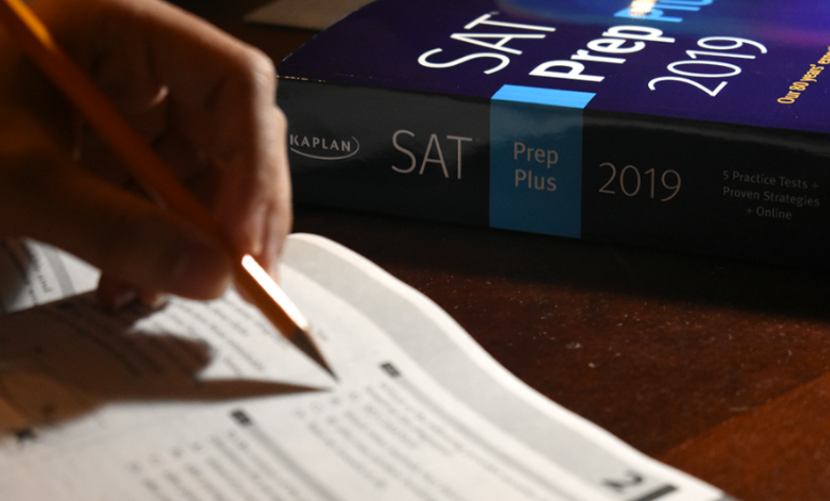Need help with SAT studying? Here’s where to start
Some colleges check scores, while others don’t. But regardless, a good SAT score can help you outstand academically.
Unlike studying for any other exam, SAT studying is more than just studying the material you took from your English, Math, Social Studies, and such classes. It solely focuses on your test-taking skills and your attention to detail when reading passages to identify the main ideas; correct grammatical, punctuation, spelling, and capitalization errors, sentence organization, and problem-solving skills when it comes to math.
These topics are divided into sections, the first being the reading, the second being grammatical/spelling/punctuation correction, the third being mathematical problem-solving without a calculator, and the last being the same but with a calculator.
So, here are some ways to prepare yourself for all the sections.
Do more than just scan the passages for keywords.
Okay, I admit, I’m guilty of this. A better idea than just scanning the passage for keywords and selecting the answer that looks like it makes the most sense in questions will not get you a great score, only by a lucky chance it will, but it’s never a high chance. Instead, you want a guaranteed high score, right?
For that, it takes more than just scanning the article. It takes reading the entire thing and rereading if necessary to fully comprehend the main idea. Before you start reading, skim all of the questions and understand what they’re asking (as well as the answers, and what they mean), then go ahead and read the article so you don’t have to make so many trips back and forth.
What matters the most is conserving time and getting the most questions answered correctly since they’re all worth the same amount of points. The easier questions can be answered later, as they’ll take up a lot less of your time compared to the more difficult ones. The SAT is not only about your skill in academic knowledge but your readiness for the college lifestyle.
Annotate, annotate, annotate.
Some students find annotating helpful while others don’t need to annotate (as much) due to preference. But leaving an SAT study guide untouched entirely could lead to a score lower than expected, simply because annotations are helpful to break down paragraphs. The plot and theme of the passage won’t just come to you, you’ll need to make notes to simplify it.
However, you don’t need to fill up the entire page with annotations. Some people do fine with just a few, but others find that it helps them more if they take more notes. For starters, underline a sentence you didn’t understand until it took you a couple of times to comprehend. Then, put a note next to it, defying what it’s saying in simple terms. You can do this with paragraphs. Next thing you know, you’ll have the passage’s plot and theme right in front of you, and all of the questions will become easier.
Reread to limit your answers.
A lot of people know the tip where you can cross out two obvious incorrect answers to help you with a question you understand; that tip still works, but it leaves you with two other answers which both look correct, leaving a long period of just debate. Getting rid of always ending up in that position is easy: Reread.
You may have already reread the passage and understood it, but when it comes to a certain question, it leaves you stumped. Instead of making an educated guess, go back to the certain context you’ll need for the question. Perhaps you overlooked the detail it’s asking you about, or it’s asking what it means in terms of the plot.
Khan Academy can be used as a great resource to prepare for all of the sections in the SAT, both digitally and on paper. It provides a lot of questions that have (and possibly haven’t) already been on the SAT, preparing you by providing section selection (i.e. math, reading, and/or English) and full practice tests.
“I used Khan Academy for SAT studying by doing the practices and full tests,” said junior Tracy Duong. “What I recommend to do is study in a quiet place like your room and listen to calming music. I enjoy it because it helps me focus easier.”
Keep in mind…
YOU come first.
That’s right. Unless you know you’re in shape and ready to study, don’t begin because later on, you could become hungry, thirsty, tired, have to use the restroom, and so on. Those are the easiest ways to get distracted. Before you start studying, be sure you’ll have no excuse to get up during your study session.
That being said, take a nap, use the restroom, grab a drink, and/or a snack. Whatever it is that you think you’ll need later on, get it now so you don’t have to later. That way, you’ll have a nice and smooth study session without interruptions.
However, if you don’t have the motivation to study/feel like you’re procrastinating, here would be some good ways to help.
Don’t believe it’s the end of the world if you don’t get a great score.
Aim for a score that’s not too low, but also not too high. Compare your old scores and your most recent score from PSATs, and with those scores, come up with a new score to aim for. For example, if you notice you’re increasing by 100 for every new PSAT you take, make your goal to achieve between 100 to 200 more points on the SAT.
But if your PSAT scores aren’t increasing as much, or stay within a specific hundred range, aim for a score that won’t be too impossible for you to achieve. Going from an 800 to 900/950/1000 is a great way to set a goal, but going from an 800 to 1300 could be quite literally draining in terms of uneven studying, skipping hours of sleep, and such.
If you’d really like to improve your studying habits, be sure to even out your studying daily, and be sure to make time for everything. Here is a 13-minute YouTube video for reference on how you can improve, based on someone’s personal experience.
Not all colleges want your SAT score!
It’s true; some students stress about the SATs overall, but others don’t. Instead of the test being required nowadays, it is now recommended for certain colleges (mainly Ivy-League universities). The reason is due to COVID-19, of course, but other reasons lead to opinionated conversations.
However, the SAT could possibly become required for new students as we stray further and further away from the pandemic era. Nonetheless, the SAT does have reasons why it’s not needed, but it does play a big part in college admission. So study, study, study!

Grace is a Junior at Niles North. She joined NSN after a spark of interest in journalism as a future career and writing as her favorite hobby.







